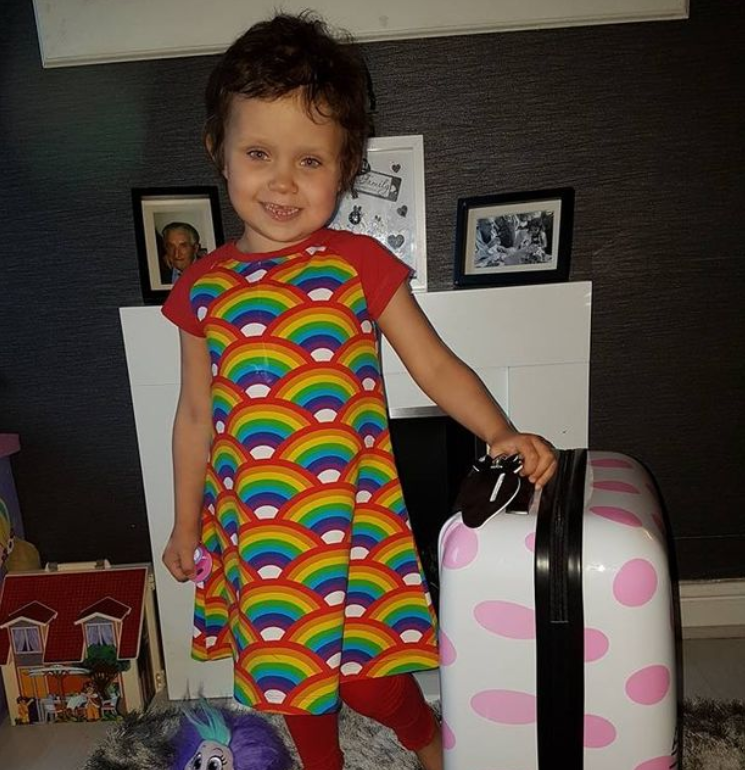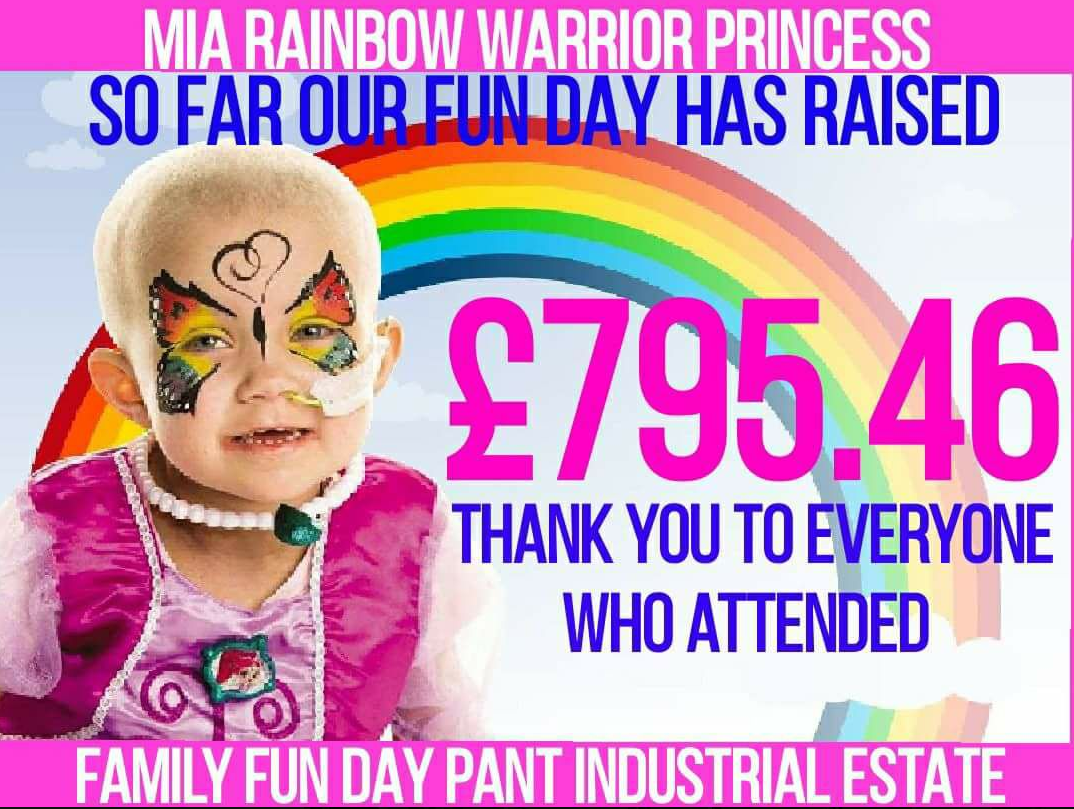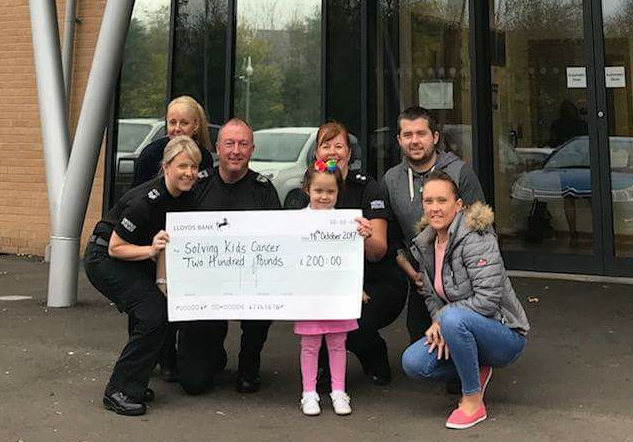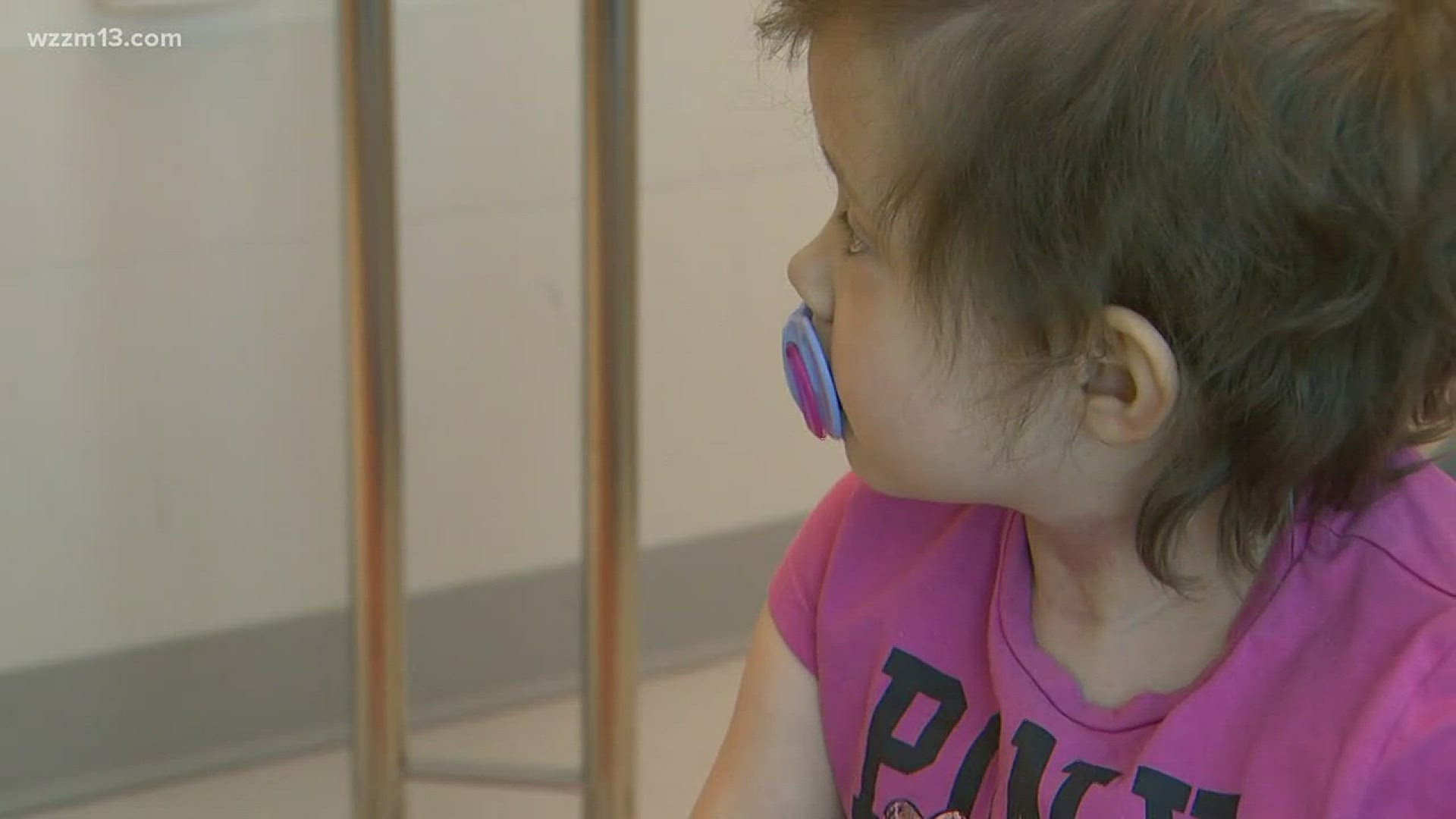There are many forms of childhood cancers, but one carries the weight of being the rarest and most deadly.
Neuroblastoma.
It's rare because fewer than 20,000 cases are diagnosed each year. It's deadly because if it goes into remission, and then returns, it proves to be fatal.
This form of cancer is most common in babies. About one in every 7,000 children is affected, and 90 percent of the cases occur in children less than 5 years old.
Treatment for neuroblastoma depends on the risk. Low-risk neuroblastoma in babies usually has a good outcome. For children diagnosed with high-risk neuroblastoma, there's a 40 percent survival rate, despite aggressive treatment.
Joshua Chambers and Kirsty Mahoney, a set of parents from the United Kingdom, were suddenly faced with this deadly disease in early 2016 when their daughter, Mia, was diagnosed.

"Mia wasn't feeling well and complaining of a stomach ache," said Kirsty. "I began rubbing her belly and felt a lump near her kidney."
Kirsty and Joshua took Mia to a local hospital in Merthyr, Tydfil, Wales, which is about a three hour drive directly west from London.
"Doctors performed several tests on Mia," said Joshua. "Within a week, we were told she had high-risk neuroblastoma, and it had already advanced to stage 4.
"Being told your child has cancer was kind of a kick in the teeth, "Joshua said.
Since her diagnosis, Mia was forced to endure a series of aggressive treatments, which included three months of intensive chemotherapy, surgery (doctors removed a kidney and an ovary), a stem cell transplant and radiotherapy.
"The standard treatment caused her tumor to shrink by 90 percent, so it was nice to see that working," said Joshua. "We were then told that Mia was in remission."
But that didn't mean she was cured.
"Unfortunately, historically, about 50 percent of the children relapse after remission, and when they relapse, there is no cure," said Dr. Giselle Sholler, Director of Pediatric Oncology Research at Helen DeVos Children's Hospital in Grand Rapids, Michigan.
"Things were looking good for Mia, but she was still at a high risk for the cancer to come back," said Kirsty. "I knew I could never, ever go through something like this again, so I went on a mission to try and find something to prevent [the cancer] from coming back."
Kirsty began researching online, checking out websites and forums that discussed neuroblastoma and what families diagnosed with it are doing.
"I would have sold my parents house, my house, the cars, anything that was of value, to get Mia the help she needed," said Kirsty.
During her extensive internet searches, Kirsty stumbled across a story about a boy who was receiving a clinical trial for neuroblastoma at Helen DeVos Children's Hospital.
"The [Chambers] were able to find us through a neuroblastoma advocacy community in England," said Dr. Sholler. "The family emailed and connected with our team and we worked through the process of accepting them as a patient."
The clinical trial offered in Grand Rapids is called DFMO, which is short for difluoromethylornithine.
"The trial is trying to prevent children from relapsing," said Dr. Sholler. "The medication targets the cancer stem cells, which are the cells hiding in the patient's body waiting to come back and cause the relapse."
It's a pill that the patient takes twice a day for two years.
"If we can stop a relapse from happening, then these children can be cured," added Dr. Sholler.
Kirsty and Joshua both knew this treatment was a must if Mia was to survive. The trial drug is provided for free, but patients are responsible for paying for both the clinic visits and scans, if not covered by insurance.
For the Chambers family, there was an additional cost -- travel. They were living 3,688 miles east of Grand Rapids in the United Kingdom.
The only way Mia could gain access to the trial medication was if her family could find a way to afford all the expenses, in particular, making sure she could make six trips to Grand Rapids over the course of the 2-year trial.
Joshua and Kirsty started a fundraising campaign in Merthyr called, "Solving Kids' Cancer," which helps organize fundraising campaigns to support children and families affected by neuroblastoma.

"We started fundraising in February 2017," said Joshua. "The first month of the fundraising was just general people finding out without any events, and we raised 21,000 pounds (which converts to a little more than $28,000)."
Then the campaign really started to take off.
"A local florist in Merthyr decided to convert her floral shop into a rainbow-making factory," said Joshua. "People would come into the flower shop, make purchases, and with a donation could also get one of the rainbows (which were made of colorful ribbon)."
Mia soon became known as "The Rainbow Warrior Princess."
The small town of Merthyr, which barely has more than 60,000 people living in it, began stepping up for Mia and her parents in a big way.
"Every single person in the community got behind us," said Joshua. "In the first three months, we raised nearly 200,000 pounds (which converts to $267,000).
"We expected to raise around 30,000 pounds. It was amazing. I've never known anything to happen like that in my life."
Everywhere you turned in Merthyr, you saw rainbow ribbons.

"You go around back home right now and every single retailer, car garage and building is covered in Mia's bows," said Joshua. "When some body buys a car, when they leave the lot, one of Mia's bows is attached to it."
Local law enforcement vehicles also travel around town with Mia's bows on them. Other fundraising events like 5k runs were established, bringing in more money for Mia.
During the height of Mia's fundraising, there was one four week span where 104,000 pounds (which converts to $139, 241) was raised.
"I thought the donating would have stopped when people knew we had reached what we needed to cover expenses, but it didn't stop," said Kirsty. "Our town banded together to make sure Mia could get this medication."
Mia was determined eligible for the clinical trial. Joshua and Kirsty made their first trip to Grand Rapids in August 2017.

"When Mia arrived, she was weak from all the therapy, but her neuroblastoma was in remission, and that's the time we want to start the experimental medication," said Dr. Sholler. "She took her first doses and did great with it."
Thanks to the monies raised, Mia and her parents were able to make a return trip to Grand Rapids in November so she could receive the second dose of medication.
"She's still in remission which is great," said Dr. Sholler, soon after looking over Mia's scans from the November visit. "The first six months [on the trial] is the highest risk time so we have to follow her closely."
Mia and her family will make their third trip from Merthyr to Grand Rapids in February 2018. After that, if she's still in remission, Mia's fourth trip back won't occur until six months later.
"Things that you could never dream of happening, happened," said Joshua. "It's been quite humbling to see how people come together to help a person they don't even know."
At last check, Mia's fundraising campaign has eclipsed the 300,000 pounds plateau, and is still growing. The money that Mia and her family don't use will be made available for other children who suffer from neuroblastoma.
If you'd like to continue to follow Mia's journey on Facebook, click here. If you'd like to donate, click here.
If you know of a story that should be profiled on "Our Michigan Life," please send an email to life@wzzm13.com.
►Make it easy to keep up to date with more stories like this. Download the WZZM 13 app now.
Have a news tip? Email news@wzzm13.com, visit our Facebook page or Twitter.

